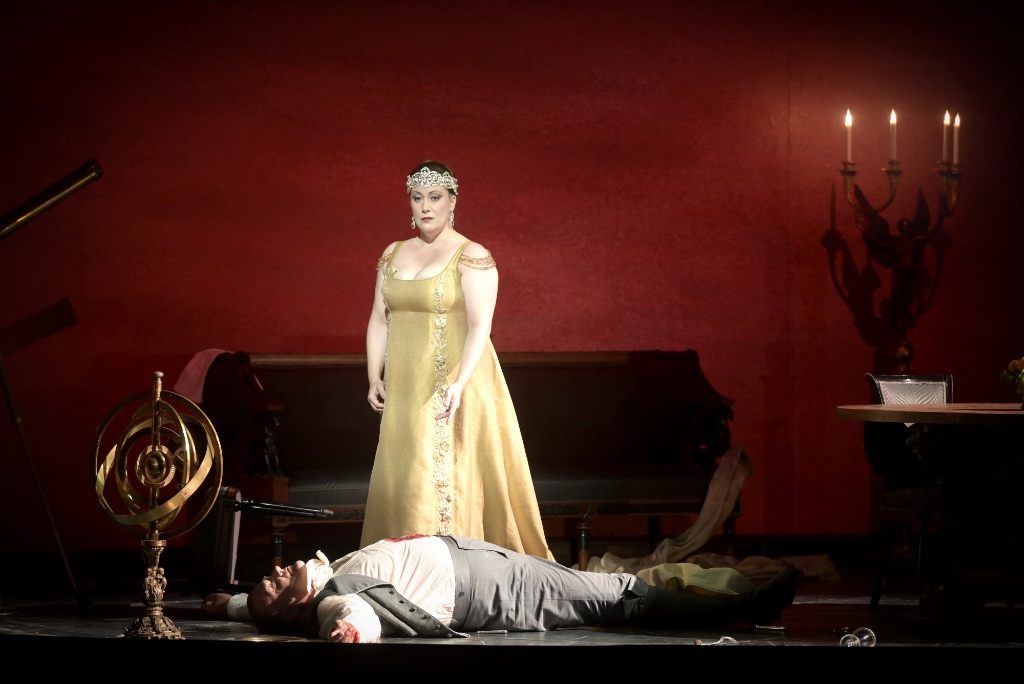
Pierre Audi’s 2014 production of Giacomo Puccini’s Tosca, revived in 2016 and again now at the Bastille, is fast becoming a stalwart of the Opéra de Paris’s repertoire, and it is easy to see why: with a set that is both large enough to fill the deep, wide stage, it is not disconcertingly avant-garde enough to shock the generally conservative Puccini opera-going public. It also respects the opera’s original 1800 setting during the Napoleonic Wars. In other words, it is a production more likely to stand the test of time than other more provocative or modish stagings.
Why review this rerun, especially as I wrote about its first reprise in 2016? Because it has been chosen to launch the 2022-23 season and, more importantly, it marks the official conducting debut of the Opéra de Paris’s new music director, Gustavo Dudamel. The presence of French President Emmanuel Macron and several of his ministers on opening night underlined the importance attached to the occasion.
While Tosca might feel like an overly safe and – dare I say it? – dull first choice by the notoriously effervescent and charismatic conductor, its popularity and the reliability of this production mean that any unwelcome distractions or controversies were unlikely to affect his full introduction to Parisian audiences. Dudamel certainly does not disappoint. He directs the orchestra of the Opéra de Paris with precision and sensitivity. In line with his reputation, we might have expected a rather more fiery and even attention-grabbing performance, but his discretion was surely an effective way of telling his new audience that he is here for the long haul and not simply in the business of providing cheap thrills. He also enticed some gorgeous playing from the musicians, bringing out interesting nuances and harmonies that I had not previously noticed. The strange orchestral prelude to Act III, for example, together with the arresting shepherd boy’s song (delivered here with wonderful simplicity by treble Christian Rodrigue Moungoungou), seemed to come from an entirely different tonal world.
Vocally, the cast is extremely strong. The Welsh baritone Bryn Terfel reprises his role from 2016 as the evil police chief Scarpia, who tries to have his wicked way with Tosca. Terfel is again on menacing form, using his powerful voice to magnificent and varied effect and endowing the role with a subtlety that Puccini and his librettists possibly fail to give it on the page. (The time cannot be far off when in an updated production Scarpia will be portrayed as Harvey Weinstein, receiving his comeuppance from the defiant Tosca.) Three strong baritones, including the always excellent Gerald Finley (whose performance as Hans Sachs in Wagner’s Die Meistersinger at the Bastille remains a high point for me), will be playing Scarpia later in the run.
The Maltese tenor Joseph Calleja (to be replaced later by Brian Jagde), as the artist Caravadossi, sings with suitable ardor. On opening night, the lower and middle registers of his voice had full – almost baritonal – body, but his high notes seemed to be missing the same strength. Only afterward did I hear that he had been suffering from a cold but did not want it to be announced (as is often the case when a singer is slightly indisposed) before the show began. That, however, did not stop the audience from erupting with fervent applause (with one notably vocal dissenter) after his beautiful performance of the Act III show-stopping aria, “E Lucevan le Stelle.”
Spanish soprano Saloa Hernández – to be followed in October and November by Elena Stikhina – showed that she has learned a great deal from her teachers Montserrat Caballé and Renata Scotto (both of whom were notable interpreters of the role) by giving a vocally stunning performance as Tosca. Her set-piece arias, especially “Vissi d’Arte” in Act II, were delivered with extraordinary dexterity and beauty of tone.
All in all, it was a steady if unspectacular beginning to Dudamel’s tenure at the helm of the Opéra de Paris. He returns at the beginning of 2023 to conduct a production of Wagner’s Tristan und Isolde, which will surely prove a tougher and possibly more rewarding challenge to his conducting skills.
Nick Hammond’s latest book, The Powers of Sound and Song in Early Modern Paris, is available in paperback and as an e-book here and from online vendors.
Favorite